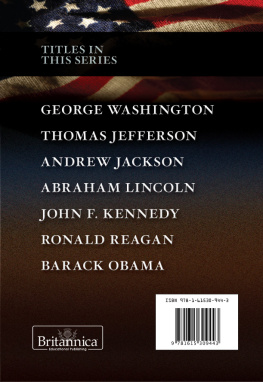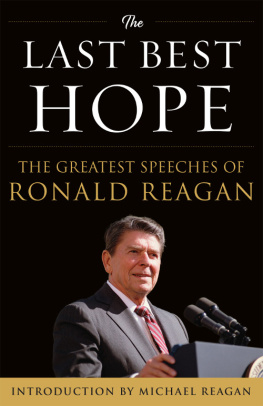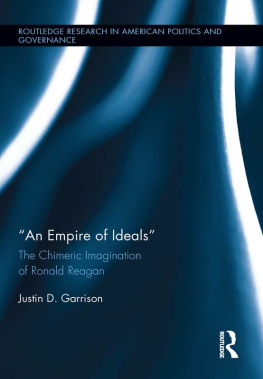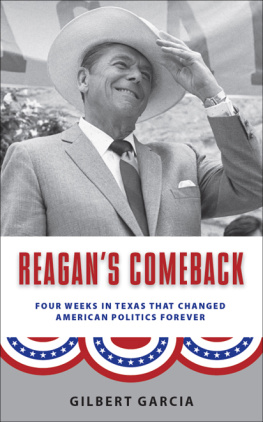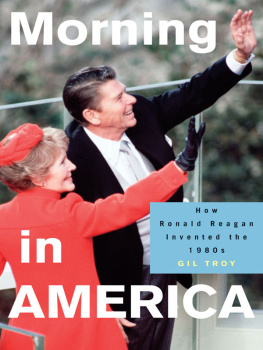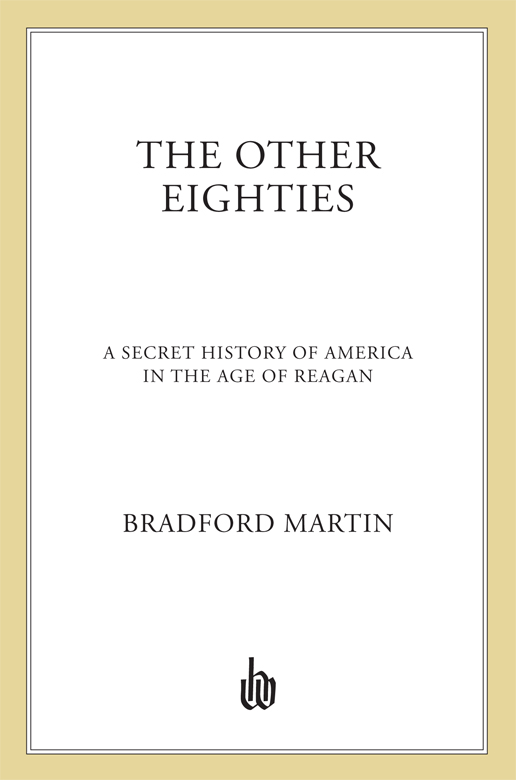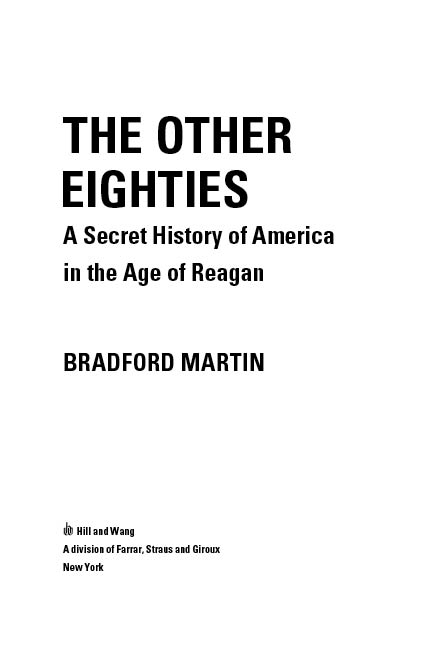
For Jackson, Hazel, Harry, and Charlie
CONTENTS
PREFACE
T his book started with a challenge. Discussing the as yet modest output of historical literature on the 1980s, an editor friend announced, Any book on the 1980s inevitably turns into a Reagan book. A substantial portion of his assertion rang true. In many ways, the singular figure of Ronald Wilson Reagan, the most popular president in a generation, dominated national life during the decade. The presidents advocates credited him with monumental accomplishments, no less than restoring prosperity, regaining national pride, and spearheading Cold War victory. The beaming accounts of his presidency and achievements only intensified after his death in 2004, generating a wave of affectionate tributes in the popular media. Still, a look at the vicissitudes of presidential popularity during Reagans two terms reveals that a sizable swath of the American public disapproved of the way he handled his job, even at moments of his greatest triumph. This suggests that there was more to the story, that there was another 1980s, its history buried under the celebratory narrative of Reagan and conservative ascendancy. The gauntlet thrown down at my feet, I picked it up, determined to craft the untold account of the decades opposition.
The task was more daunting than I had imagined. Indeed, a growing raft of scholarship illuminates the decades complexities with greater sophistication than both popular accounts and much of the earliest scholarship on the period. This scholarship offers provocative revelations, sometimes fraught with irony, occasionally contradictory. These accounts argue, variously, that Reagan was smarter than he appeared; that he was the single most important political figure of his age; that he was the key figure in the Great Reconciliation between 1960s liberalism and 1980s conservatism; that he decisively inspired and presided over a rightward shift in the nations political economy and political culture, somehow managing to leave room for a more tolerant and diverse society than existed at the decades outset; that he effectively marshaled an unapologetic patriotism and nationalism in world affairs that John F. Kennedy and Franklin D. Roosevelt also tapped into, albeit one that pointed the nation in a profoundly different ideological direction; and that Republican electoral triumphs were more a function of the personal popularity that Reagans warmth, humor, and reassuring leadership style engendered than any fundamental realignment of the American electorate in a more conservative direction. Substantial elements of truth resound through these claims, and this book, far from rejecting them, seeks to acknowledge its intellectual indebtedness en route to sifting through and building upon these interpretations. What these accounts do have in common, however, and what my own study embarks on a quest to move beyond, is a profound Reaganocentrism. The foregrounding of Reagan in historical interpretations of the 1980s, though partially justified, displaces many important actors, events, and movements whose stories deserve telling.
Historical memory renders Reagans electoral victories in 1980 and 1984 veritable avalanches, from the rejection of the embattled Jimmy Carter and embrace of a new direction in American politics in 1980 to the 1984 reelection, which is often viewed as the culmination of more than a decade of ferment for conservative ideasfrom lower taxes and smaller government to renewed Cold War vitality and family values. These figures suggest Reagans status as a polarizing figure for a sizable but less-trumpeted group of Americans in the 1980s who remained unenchanted by his vision of Morning in America. This book examines the less-told story of Americans who opposed the decades prevailing political tides. In doing so, it relies on several key questions as guideposts for constructing an alternative perspective: What was the nature of opposition to Reagan conservatism in the 1980s? What recurring themes, ideas, and sensibilities infused it? What were its accomplishments, limitations, and downright failures? Why has this opposition been so overshadowed in the decades dominant narrative?
The search for answers to these questions reveals a handful of salient ideas and discernible patterns. First and foremost, accurately telling the story of the opposition during the 1980s requires moving beyond mainstream politics. The Democratic Party opened the decade reeling, its traditional constituencies ravaged by the emergent phenomenon of Reagan Democrats, and finished the decade enmeshed in the headlong pursuit of regaining the political center by moving farther to the right. By Walter Mondales 1984 campaign, political liberalism had reoriented itself, away from the New Deal vision of benign governmental promotion of the public well-being that dominated the mid-twentieth century and toward a program founded on private-sector-driven economic growth that modestly promised to maintain most existing government services with a new focus on frugal management. To this, Mondale added the candid but politically fatal admission that he would be forced to raise taxes to offset the burgeoning Reagan deficit. In 1988 the Democratic presidential candidate found himself on the defensive against the very word liberal. Michael Dukakis shriveled as George H. W. Bush attacked him as a liberal and a card-carrying member of the ACLU. As the campaign wore on, those epithets became conflated in the popular parlance, rendering Dukakis a card-carrying liberal. The candidate spent much of the remainder of the campaign trying to avoid the label by running on a promise of efficient government management and economic growth, while trying to avoid Mondales mistake of addressing the possibility of tax hikes. In the meantime, his opponent hammered him by exploiting a series of Democratic wedge issues, most notably with the infamous Willie Horton political ad, which profiled a convicted murderer who raped a woman while on prison furlough under Dukakiss watch as Massachusetts governor. Two weak presidential candidates and their disastrous campaigns represented only the most visible symbol of a Democratic futility and disunity whose roots ran much deeper. Mondale and Dukakis embodied the defining trait of the 1980s dunderheaded Democrats that undermined the party throughout the decadethe abandonment of full-throated progressive idealism, articulated in the New Deal and the Great Society, in favor of a pragmatic, if quixotic, shift to the center. As Democrats came more and more to resemble the Republicans they putatively opposed, the resulting political identity crisis left many of the most exciting and animated adversaries of conservative Reagan-Bush-era policy outside of mainstream national politics.
For this reason, The Other Eighties focuses on the opposition to Reagan conservatism, broadly construed. This encompasses a range of voices and expressionsthose who pursued claims in traditional politics, lobbying Congress to support a nuclear freeze and celebrating Geraldine Ferraro as the first woman on a major party presidential ticket, and those who fought their battles in the cultural realm, from Bruce Springsteens humanizing portraits of the decades dispossessed to the angry artists of Gran Fury and their expressions of rage at inadequate government response to the AIDS epidemic. My central argument is that despite the decades reputation for conservative ascendancy and Reagans personal popularity, there was another 1980s, one in which the opposition played a key role. Often this role involved playing defense, engaging in a tactical struggle to preserve the liberal and progressive gains of the 1960s and 1970s. Black mayors initiatives to make municipal government more responsive to their constituencies and pro-choice womens efforts to protect abortion rights against an ever more conservative federal judiciary and a virulent pro-life countermovement exemplify this struggle for field position. Responding to Reagan foreign policy, 1980s activists tamed, tempered, and constrained the most bellicose and ambitious aspects of the administrations designs. It is a notable outcome of this era, for instance, that Americans do not speak of a Nicaragua War.


